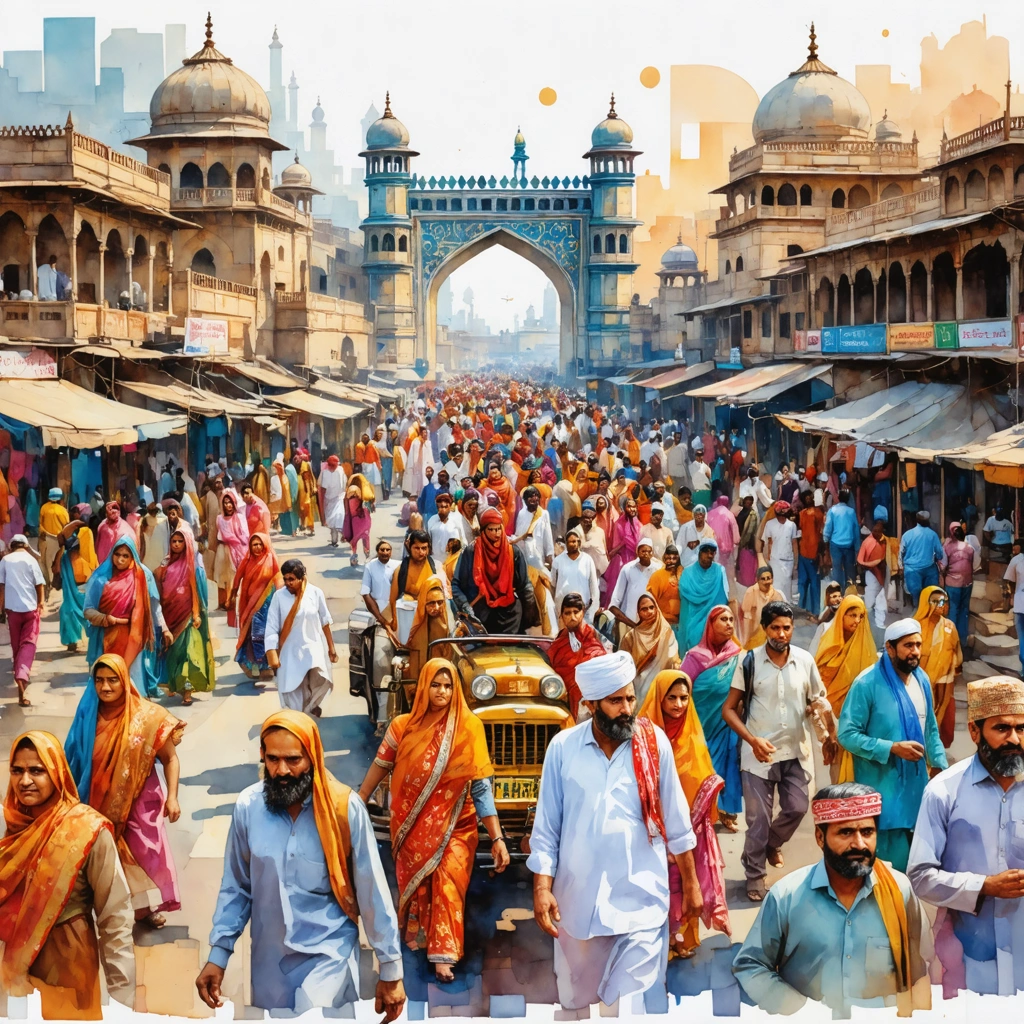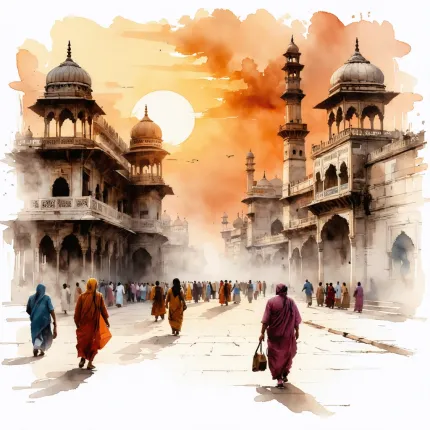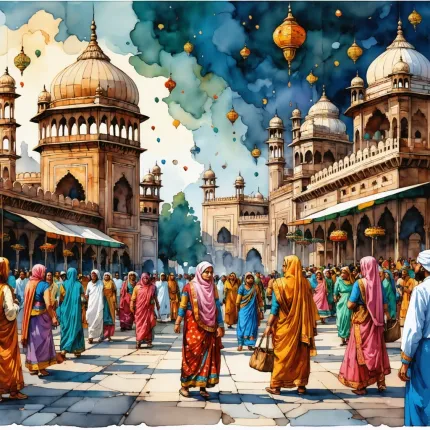
Bridging Traditions and Modernity: Why Understanding Islamic Celebrations Matters
Imagine walking through the vibrant streets of India during a festive season where the air is thick with the scent of sweet desserts, the hum of heartfelt prayers, and the joyful chatter of families adorned in their finest clothes. While India is often celebrated for its kaleidoscope of cultures and religions, the Islamic cultural events hosted by its Muslim community offer a unique window into centuries-old traditions that continue to thrive and evolve. Yet, for many, these celebrations remain a mystery—a series of dates on a calendar or distant news headlines. This lack of understanding can unintentionally create distance between communities, leaving rich cultural tapestries unexplored.
As India moves into 2025, a year that promises renewed cultural exchanges and deeper social conversations, there's a compelling opportunity to delve into the heart of Islamic festivities. From the joyous greetings of Eid Mubarak in Arabic, echoing across neighborhoods, to the profound rituals of Eid Ul Adha (also known as Eid Ul Azha), these events are not just religious observances but powerful expressions of identity, unity, and heritage.
Unpacking the Significance of Eid: More Than Just a Festival
Why does the Muslim community in India celebrate Eid with such fervor? And what do the terms Eid Mubarak, Eid Ul Adha, and Eid Ul Azha truly signify beyond their surface meanings? Understanding these questions reveals layers of faith, history, and communal spirit that define the cultural landscape.
Eid, which literally means "festival" or "celebration" in Arabic, is a time when Muslims come together to commemorate significant moments in Islamic history. The phrase Eid Mubarak in Arabic, meaning "Blessed Eid," is a heartfelt greeting exchanged among friends, family, and even strangers, symbolizing goodwill and shared joy.
Among the two major Eids celebrated in India, Eid Ul Adha (also known as Eid Ul Azha) holds special prominence. It honors the willingness of Prophet Ibrahim to sacrifice his son as an act of obedience to God, a story that resonates deeply with themes of faith and sacrifice. The festival is marked by communal prayers, charitable acts, and the sacrifice of an animal, which is then shared with family, neighbors, and those in need.
Yet, despite its importance, many outside the community may find the rituals and customs puzzling or may miss the nuances that make these celebrations so meaningful. This gap in understanding can sometimes lead to misconceptions or missed opportunities for cultural appreciation and solidarity.
Looking Ahead: What 2025 Holds for Islamic Cultural Events in India
The year 2025 is shaping up to be a landmark period for Islamic cultural events across India, with communities planning vibrant gatherings that blend tradition with contemporary expressions of faith and togetherness. From metropolitan hubs to smaller towns, the celebrations will showcase:
- Inclusive community feasts that invite participation beyond religious boundaries.
- Artistic exhibitions highlighting Islamic calligraphy, music, and culinary delights.
- Educational programs aimed at fostering interfaith dialogue and cultural literacy.
By understanding the significance of greetings like Eid Mubarak in Arabic and the rituals surrounding Eid Ul Adha/Eid Ul Azha, we open doors to richer conversations and more profound connections. This blog will guide you through the essential cultural events of India’s Muslim community in 2025, providing insights that go beyond surface-level observations and celebrating the vibrant identities that make India’s social fabric so wonderfully diverse.
So whether you’re someone eager to deepen your cultural knowledge, a student of religious studies, or simply curious about the world around you, join us as we embark on this illuminating journey. Together, we’ll explore how these Islamic cultural events encapsulate faith, unity, and the timeless spirit of celebration.

Islamic Cultural Events: Understanding the Cultural Events of India’s Muslim Community in 2025
What are the major Islamic cultural events celebrated by India’s Muslim community in 2025?
India’s Muslim community observes several significant Islamic cultural events throughout the year, each imbued with rich religious and social traditions. In 2025, key events include Eid Ul Fitr, Eid Ul Adha (also spelled Eid Ul Azha), Muharram, Ramadan, and Milad-un-Nabi. These events not only mark important moments in the Islamic lunar calendar but also serve as opportunities for communal bonding, charity, and cultural expression.
Among these, Eid Ul Adha is particularly prominent in 2025 as it commemorates the willingness of Prophet Ibrahim (Abraham) to sacrifice his son in obedience to God. The celebrations involve prayer services, the ritual sacrifice of animals, and distributing meat to the needy, reflecting themes of devotion and generosity.
How do the celebrations of Eid Ul Adha and Eid Ul Azha differ or relate to each other in India?
The terms "Eid Ul Adha" and "Eid Ul Azha" are often used interchangeably in India and globally, both referring to the same festival celebrating Prophet Ibrahim’s sacrifice. The slight variation in spelling arises from transliteration differences from Arabic to English and regional linguistic preferences.
In 2025, communities across India will mark Eid Ul Adha/Eid Ul Azha with traditional prayers at mosques or open grounds, followed by the sacrificial offering known as Qurbani. Families and communities come together to share food, and the phrase “Eid Mubarak” (عيد مبارك), meaning “Blessed Eid” in Arabic, is exchanged warmly among friends and neighbors.
What is the significance of the phrase “Eid Mubarak” in Arabic during these events?
The greeting “Eid Mubarak” in Arabic is a deeply symbolic expression used during Islamic festivals such as Eid Ul Fitr and Eid Ul Adha. Translated as “Blessed Eid,” it conveys wishes of happiness, blessings, and prosperity to others.
In India’s diverse Muslim communities, saying “Eid Mubarak” fosters a sense of unity and shared celebration across linguistic and cultural lines. The phrase is often accompanied by acts of kindness such as exchanging gifts, preparing special meals, and philanthropic activities, which are essential aspects of Islamic cultural events.
How do Islamic cultural events like Eid Ul Adha impact social and economic life in India?
Islamic cultural events, especially Eid Ul Adha, have profound social and economic impacts in India. Socially, these events strengthen community bonds through collective prayers, feasts, and charitable acts. They promote interfaith harmony as people from different backgrounds often participate or observe these festivities.
Economically, Eid Ul Adha stimulates various sectors:
- Livestock Market: The demand for sacrificial animals such as goats, sheep, and camels peaks, benefiting farmers and traders.
- Retail and Food Industry: Markets see increased sales of festive clothing, gifts, and special foods prepared at home.
- Charitable Organizations: Distribution of meat and donations during Eid Ul Adha enhances community welfare programs, especially for the underprivileged.
In 2025, the economic ripple effect of these events is expected to be substantial, with estimates from previous years indicating a surge in consumer spending by up to 15-20% around Eid periods in regions with significant Muslim populations.
What are some unique traditions associated with Islamic cultural events in different regions of India?
India’s Muslim community is incredibly diverse, with various regional customs enriching the core Islamic celebrations. For instance:
- Hyderabad: Known for its grand communal feasts and the tradition of “Haleem” preparation during Ramadan and Eid Ul Fitr.
- Delhi and Uttar Pradesh: Famous for the elaborate Qurbani ceremonies during Eid Ul Adha and vibrant processions during Muharram.
- Kerala: Incorporates local cultural elements like folk performances and unique culinary dishes during Eid events.
These regional variations highlight how Islamic cultural events in India are both a reflection of religious devotion and a celebration of local heritage.
How can one participate respectfully in Islamic cultural events in India during 2025?
Participation in Islamic cultural events can be a rewarding way to engage with India’s rich cultural tapestry. To do so respectfully:
- Learn the Significance: Understanding the religious and cultural importance behind events like Eid Ul Adha helps foster genuine respect.
- Use Appropriate Greetings: Saying “Eid Mubarak” in Arabic or local languages is a courteous way to join in the celebrations.
- Dress Modestly: Wearing modest attire is appreciated during communal prayers and gatherings.
- Respect Rituals: Observe or participate in rituals such as prayers or Qurbani with sensitivity and without disruption.
- Engage in Charity: Supporting charitable causes during these events reflects the spirit of generosity central to Islamic festivals.
By following these guidelines, visitors and non-Muslims can experience the warmth and vibrancy of India’s Muslim cultural events in 2025 meaningfully.
What resources are available to learn more about Islamic cultural events in India for 2025?
To deepen understanding of Islamic cultural events in India, consider exploring:
- Local Mosques and Community Centers: Many organize educational sessions and open houses during festival periods.
- Government and NGO Cultural Programs: Often host exhibitions and cultural festivals highlighting Muslim heritage.
- Online Platforms: Websites, blogs, and social media pages dedicated to Indian Muslim culture provide updated event calendars and explanatory content.
- Academic Publications: Studies on India’s Islamic traditions offer in-depth historical and sociological perspectives.
Engaging with these resources will ensure that your knowledge of Islamic cultural events in 2025 is well-rounded, respectful, and insightful.


